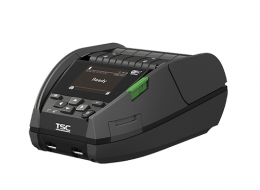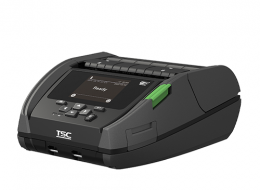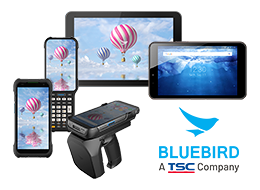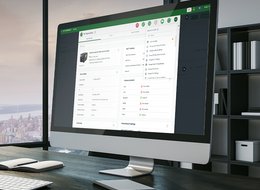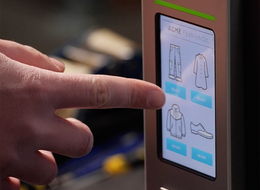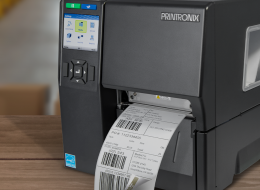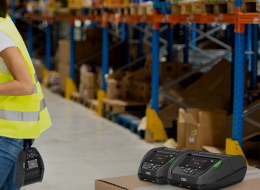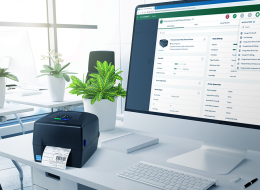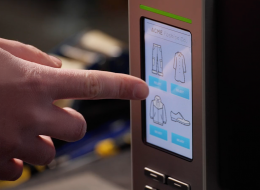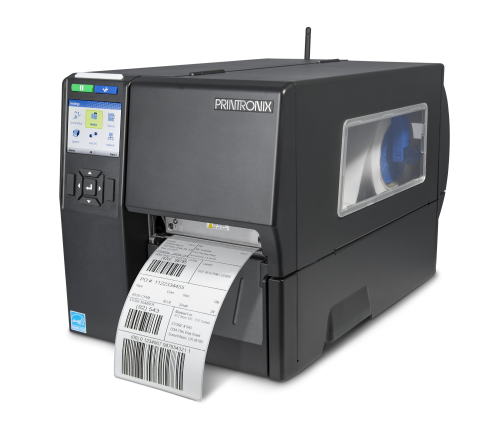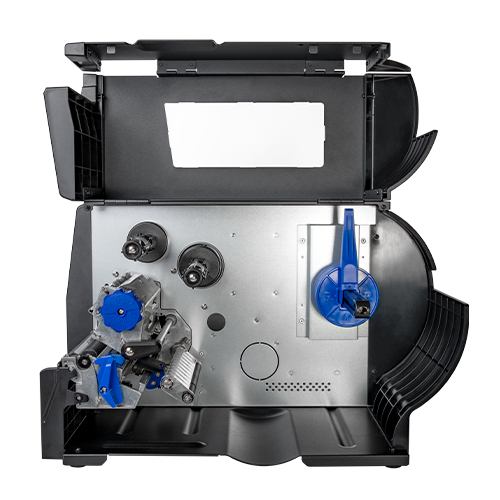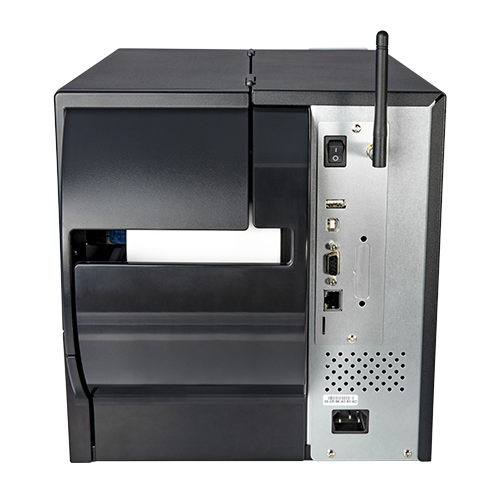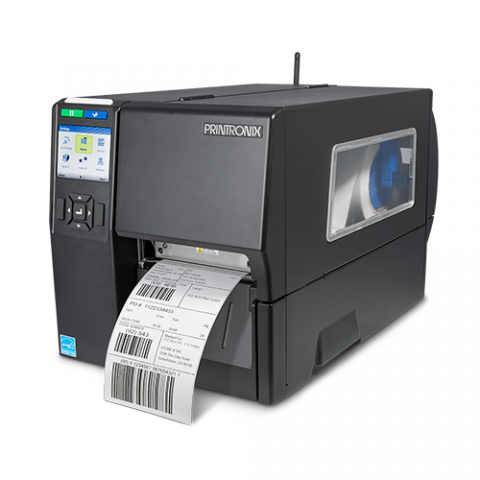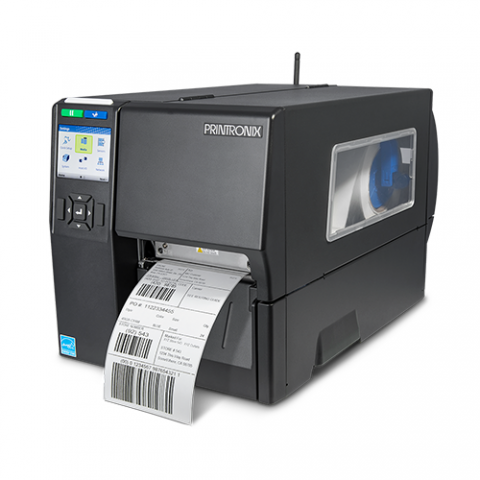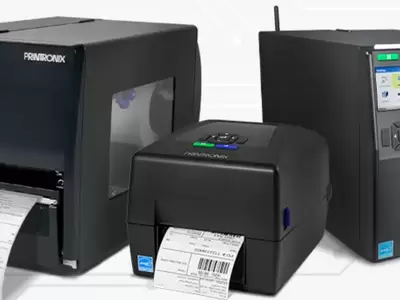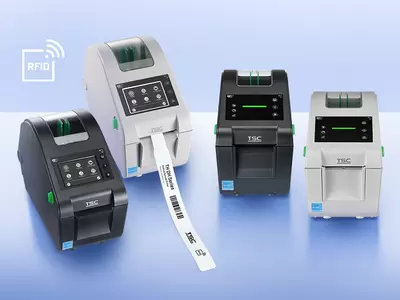T4000 Series 4-Inch Enterprise Industrial RFID Printers
The enhanced T4000 models offer industrial printer features and RFID encoding at a much more affordable price compared to traditional mid-range RFID printers.
Qualifies for:
- Extended Warranty 3 & 5 years
- Comprehensive Warranty 3 & 5 years
- On-Site service 1 & 3 years
Industries and Applications
Due to their compact size, the T4000 RFID printers can fit into environments where space is limited but enterprise-level performance and RFID printing is a requirement.
Small, Fast, and Ready to Boost Productivity.
Our T4000 Enterprise RFID Printers feature our same compact and affordable design as our Printronix Auto ID enterprise industrial printers with the ability to print 5,000 labels a day at speeds of up to 12-inches per second. This series also includes RFID capability, Printronix System Architecture (PSA), with multiple connectivity options, remote printer management tools, and automated alerts to keep your enterprise operating at optimum efficiency and productivity.
The T4000 is an industrial printer with the ability to print and encode on standard RIFD labels and on-metals tags.
RFID upgrade kits are available for the T4000 standard model to provide customers a cost-effective solution to integrate RFID technology into their operation without the upfront investment.
- 203 dpi (8 dots/mm)300 dpi (12 dots/mm)
- Direct thermal/Thermal transferDirect thermal/Thermal transfer
- Color LCD with buttonsColor LCD with buttons
- Ethernet
Serial RS-232
USBEthernet
Serial RS-232
USB - Bluetooth
Wi-FiBluetooth
Wi-Fi - PrintNet Enterprise
SOTI Connect (license required)PrintNet Enterprise
SOTI Connect (license required) - IndustrialIndustrial
- 12 ips (304.8 mm/s)10 ips (254 mm/s)
- 4.1" (104 mm)4.1" (104 mm)
- 128 MB128 MB
- 128 MB128 MB
- 4.72" (120 mm)4.72" (120 mm)
- Roll or Fan-Fold Labels, TagsRoll or Fan-Fold Labels, Tags
- 450 Meters450 Meters
- 4.3" (110 mm)4.3" (110 mm)
- 1" (25.4 mm) – 3" (76.2 mm)1" (25.4 mm) – 3" (76.2 mm)
- 0.25" Tear-Off; Peel-Off 1"0.25" Tear-Off; Peel-Off 1"
- Rugged metal enclosure with bi-fold side panelRugged metal enclosure with bi-fold side panel
- Most major printer languages: PGL/VGL/ZGL/TGL/IGL/STGL/DGL/IEGL/MGL/EGLMost major printer languages: PGL/VGL/ZGL/TGL/IGL/STGL/DGL/IEGL/MGL/EGL
{[{ key }]}
Yes. You can establish rules using TSC Console Web so that your printer will execute what you have set up every time a condition is met. Conditions for a rule can be time-based or event-driven.
You can set your printer to take an activity daily, weekly, monthly, or at a particular date/time.
The printheads are interchangeable.
No. TSC Console Web must be used through either a wireless or wired network. That is to say your printer must support either Wi-Fi or Ethernet interface if you want to manage the printer using TSC Console Web.
Yes, you need a screwdriver – the printhead is retained in place by a single screw. The screw is very accessible and easily removed.
The control panel printer setup wizard provides an easy-to-follow calibration process. The Settings menu allows you to select the Gap/Mark sensor to match the type of media installed. In addition, you can set the printer to do an auto Calibrate at power up or when print station has been closed. In all cases the printer will advance a few labels and calibrate the sensors so that they will detect top-of-form.
The T4000 RFID printer has an RFID label calibration feature in the RFID menu which makes it very easy to set up the printer for both standard RFID and on-metal RFID labels. The calibration process feeds 3-4 labels to determine the optimal encoding position and RF power levels.
For Thermal Transfer applications: printheads are warranted 12 months from shipment or 1 million linear inches (whichever comes first). For Direct Thermal applications: printheads are warranted 180 days from shipment or 1 million linear inches (whichever comes first).
On-metal tags (sometimes called metal-mount or anti-metal tags) are RFID tags that are designed to operate on items made of metal. The physical properties of metal serve to reflect RF signals and so a standard RFID label would be completely undetectable by an RFID reader. On-metal tags are typically constructed with a thin foam insulator to provide a space between the metal surface and the RFID inlay. On-metal tags are available in several constructions and the ones used with printers are typically up to 1mm thick due to the foam insulator. They also should include a “bridge” between the individual tags to ensure smooth transport through the print station.
Standard Interfaces are: Serial, USB host/device and Ethernet. Optional Interfaces are: Wireless 802.11 a/b/g/n/ac and Bluetooth 4.2.

